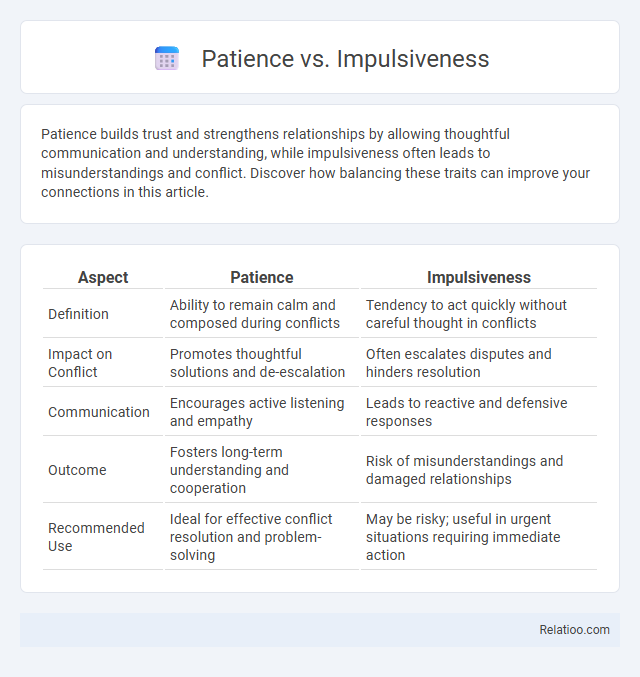Patience builds trust and strengthens relationships by allowing thoughtful communication and understanding, while impulsiveness often leads to misunderstandings and conflict. Discover how balancing these traits can improve your connections in this article.
Table of Comparison
| Aspect | Patience | Impulsiveness |
|---|---|---|
| Definition | Ability to remain calm and composed during conflicts | Tendency to act quickly without careful thought in conflicts |
| Impact on Conflict | Promotes thoughtful solutions and de-escalation | Often escalates disputes and hinders resolution |
| Communication | Encourages active listening and empathy | Leads to reactive and defensive responses |
| Outcome | Fosters long-term understanding and cooperation | Risk of misunderstandings and damaged relationships |
| Recommended Use | Ideal for effective conflict resolution and problem-solving | May be risky; useful in urgent situations requiring immediate action |
Understanding Patience and Impulsiveness
Understanding patience involves recognizing the ability to delay immediate gratification and tolerate discomfort for long-term goals, while impulsiveness is characterized by hasty actions driven by immediate desires without forethought. Your capacity to balance patience and impulsiveness affects decision-making quality, emotional regulation, and overall success in personal and professional life. Developing patience enhances self-control and thoughtful responses, reducing the negative consequences often associated with impulsive behavior.
The Psychology Behind Patience
Patience is a psychological trait associated with self-regulation, delayed gratification, and emotional resilience, enabling individuals to manage impulses and resist immediate rewards for long-term benefits. Neuropsychological studies link patience to activity in the prefrontal cortex, which governs executive functions such as impulse control and decision-making, contrasting with impulsiveness driven by the limbic system's reward-seeking tendencies. Understanding the cognitive and emotional mechanisms underlying patience provides insight into adaptive behaviors that promote mental well-being and goal achievement.
Impulsiveness: Causes and Consequences
Impulsiveness stems from neurological factors such as dopamine dysregulation, stress, and emotional triggers, often resulting in hasty decisions without forethought. This behavior can lead to negative consequences including financial loss, damaged relationships, and decreased mental well-being. Understanding your impulsive tendencies allows you to implement strategies like mindfulness and delayed gratification to mitigate these adverse effects.
Patience in Decision-Making
Patience in decision-making enhances the ability to thoroughly evaluate options, leading to more informed and rational outcomes. Studies show that individuals who practice patience are less likely to make impulsive decisions driven by immediate emotions or pressures. Cultivating patience strengthens long-term strategic thinking and reduces the risk of costly mistakes in personal and professional contexts.
Impulsiveness in Everyday Life
Impulsiveness in everyday life often leads to hasty decisions that overlook long-term consequences, affecting your relationships and financial stability. Unlike patience, impulsiveness triggers immediate reactions driven by emotions rather than thoughtful consideration, increasing the risk of mistakes and regret. Developing self-awareness and mindfulness can help manage impulsive tendencies and promote better decision-making outcomes.
Benefits of Practicing Patience
Practicing patience enhances emotional resilience by reducing stress and promoting thoughtful decision-making, which leads to better outcomes in personal and professional life. You develop stronger relationships as patience fosters empathy and effective communication, creating a foundation of trust and mutual respect. Consistent patience also improves self-control and long-term goal achievement by minimizing impulsive actions that often result in mistakes or regret.
Risks Associated with Impulsiveness
Impulsiveness often leads to hasty decisions, increasing the risk of poor outcomes in financial investments, relationships, and health. Studies show that impulsive behavior correlates with higher rates of accidents, legal issues, and substance abuse, highlighting the dangers of acting without deliberation. Emphasizing patience can mitigate these risks by promoting thoughtful decision-making and long-term planning.
Strategies for Balancing Patience and Impulsiveness
Balancing patience and impulsiveness involves cultivating self-awareness and practicing mindful decision-making to avoid rash actions while maintaining a proactive mindset. Strategies such as setting clear goals, employing delayed gratification techniques, and using reflection periods before responding support thoughtful responses without stifling spontaneity. You can enhance emotional regulation by incorporating stress management exercises and prioritizing long-term benefits over immediate urges, creating a harmonious balance between patience and impulsiveness.
Patience vs Impulsiveness in Relationships
Patience in relationships fosters trust and mutual understanding, allowing partners to navigate conflicts calmly and build emotional resilience. Impulsiveness often leads to hasty reactions and misunderstandings, which can strain communication and erode intimacy over time. Prioritizing patience over impulsiveness enhances long-term relationship stability and emotional connection.
Cultivating Patience for Long-Term Success
Cultivating patience is essential for long-term success because it allows you to make thoughtful decisions, avoid impulsive mistakes, and persevere through challenges. Impulsiveness often leads to short-term gains but can derail progress by ignoring potential consequences and opportunities for growth. Developing patience fosters resilience, strategic planning, and sustainable achievements that align with your long-term goals.

Infographic: Patience vs Impulsiveness
 relatioo.com
relatioo.com